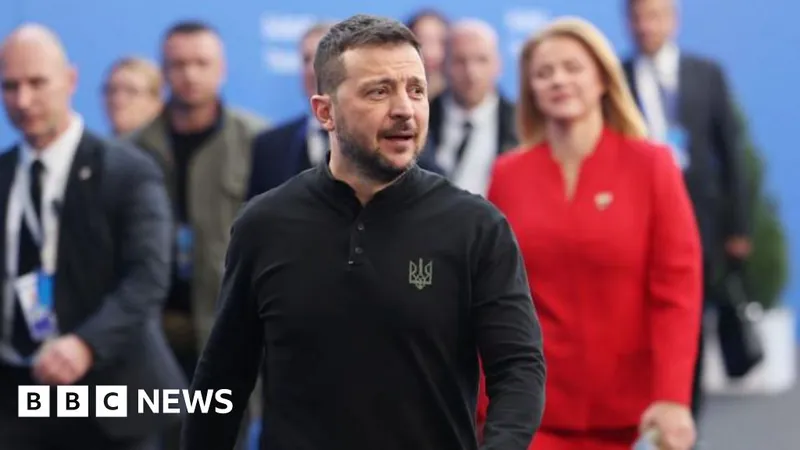
European Leaders Brace for Trump’s Return: What It Means for the Continent
2024-11-07
Author: Ting
Introduction
As Donald Trump once again takes the helm in the White House, European leaders gathered in Budapest are seizing the opportunity to strategize and navigate the implications of a Trump presidency on their nations. Trump's first term was marked by tensions, as he openly challenged European investment in NATO and voiced frustration over the trade balance between the U.S. and Europe, particularly singling out Germany for criticism.
Impact on Ukraine
The specter of Trump’s policy shifts raises urgent questions for Europe, especially regarding ongoing support for Ukraine in its conflict against Russian aggression. Ukrainian President Volodymyr Zelensky attended the summit, seeking assurances from European leaders about military and financial aid. This is particularly crucial given the U.S. has historically been Ukraine’s largest single donor, and uncertainty looms about future American involvement under a Trump administration.
Zelensky's Visit and European Assurance
During his previous tenure, Trump famously claimed he could end the conflict with Russia in a day, but many speculate about his true intentions regarding Ukraine's military success against Putin. European leaders, including UK Prime Minister Sir Keir Starmer, French President Emmanuel Macron, and German Chancellor Olaf Scholz, have assured ongoing support for Ukraine, rendering Zelensky’s visit to Budapest pivotal for reinforcing these commitments.
Concerns Over Stability
However, the outlook appears daunting. The instability in Germany's coalition government could jeopardize its contributions to Ukraine, raising further concerns as Hungary's Prime Minister Viktor Orban, a prominent Trump supporter, hosts these discussions. Orban has been criticized for his reluctance to support sanctions against Russia and his calls for a ceasefire that would sideline Ukrainian interests—a sentiment at odds with many Western leaders who advocate for Ukraine’s autonomy in negotiations.
Navigating Trump's Isolationism
While Trump’s re-election is a cause for concern, European diplomats are determined to face this challenge more effectively than in 2016 when Trump first shook the political landscape. There is a palpable anxiety regarding Trump's isolationist tendencies, particularly his skepticism toward NATO—the backbone of transatlantic security since World War II. The prospect of tariffs and a pivot toward protectionist trade policies under Trump further complicates Europe’s economic recovery, especially for nations like Germany that rely heavily on exports.
Fractured Political Landscape in the EU
The political landscape within the EU is fractured, with some member states like Slovakia and Italy expressing admiration for Trump, potentially fracturing unity at a time when collective strength is vital. Brussels fears that bilateral relations with Trump could lead to a weakened EU if solidarity falters under the pressure of populist sentiments.
Potential for Cohesion
Yet, some analysts argue that Trump’s presidency might inadvertently catalyze a stronger, more cohesive EU, much like Brexit fortified unity among member states in its aftermath. Polish Prime Minister Donald Tusk suggested that the future of Europe should focus on internal solidarity rather than external U.S. politics, underscoring a shift in priorities.
Renewed Hope and Challenges
Despite these challenges, European leaders remain hopeful. They are engaging in renewed efforts to foster collaboration and ensure that the continent does not return to the divisive rhetoric of the past. However, they must also be wary of the potential rise of right-wing populism within Europe, energized by Trump's ideology as traditional political landscapes are tested.
Conclusion
As Europe stands at a crossroads, leaders are strategizing to mitigate risks while seeking to adapt to the evolving political environment, keeping a watchful eye on how they can maintain their unity and strength in the face of an unpredictable future. The question remains: Can Europe withstand the pressures of America’s shifting political tides and emerge stronger? Only time will tell.


 Brasil (PT)
Brasil (PT)
 Canada (EN)
Canada (EN)
 Chile (ES)
Chile (ES)
 España (ES)
España (ES)
 France (FR)
France (FR)
 Hong Kong (EN)
Hong Kong (EN)
 Italia (IT)
Italia (IT)
 日本 (JA)
日本 (JA)
 Magyarország (HU)
Magyarország (HU)
 Norge (NO)
Norge (NO)
 Polska (PL)
Polska (PL)
 Schweiz (DE)
Schweiz (DE)
 Singapore (EN)
Singapore (EN)
 Sverige (SV)
Sverige (SV)
 Suomi (FI)
Suomi (FI)
 Türkiye (TR)
Türkiye (TR)